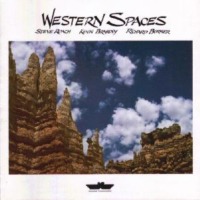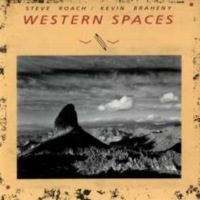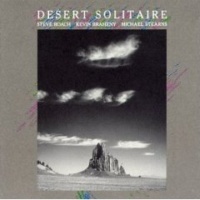Ultimate Desert Soundtracks: Western Spaces & Desert SolitaireDate: Jan 2006 |
||

The 1987 album “Western Spaces” is the first of two concept albums which have the landscapes of the American Southwest, in particular the Mojave and Sonoran deserts, as a central theme. It contains an hour of drifting cinematic music in which Roach’s sophisticated ambient music matches perfectly with Braheny’s lyrical passages, who plays his self-built EWI electronic woodwind instrument. The electro-acoustic nature paintings on “Western Spaces” aptly captures feelings of open, windswept, and desolate places. Peculiarly enough, when the album was actually realized, both Roach and Braheny were still living in the heart of Los Angeles, but especially Roach’s mind was already in the desert environment most of the time. The album opens with “The Breathing Stone”, a both spacious as shimmering ambient excursion by Roach, featuring floating synthesizer tapestries and slow tribal beats. Next comes Braheny’s sophisticated track “Desert Walkabout”, followed by highly atmospheric Roach/Thom Brennan track “New Moon at Forbidden Mesa” before the Roach & Braheny work again work together on the serene but beautiful “Desert Prayer”. Thom Brennan and Steve Roach paint the extreme desert conditions in the 20 minute track “In the heat of Venus”, which although overall hypnotizing is lasting a bit too long. With “The Slow Turning”, Roach delivers another tranquil solo effort before the serene title track closes the album, for which Roach, Burmer and Braheny join forces.
The initial 1987 release of “Western Spaces” on Innovative Communication (the one on Fortuna Records was a re-release) appeared in different covers and also featured a slightly different track listing. It contains two solo tracks by ambient musician Richard Burmer which replace the music of Kevin Braheny. The first one is the breathtaking “A Story from Rain”, a majestic piece highlighted by a powerful desert cry before things start moving.
Like its predecessor, the intense ambient music reflects the desert’s elemental power and beauty through another fine collection of evocative sound paintings. One can almost feel the intense heat and diverse extreme weather conditions as the highly visuals music goes by, describing vast landscapes, desert mountains, immense canyons and remoteness all situated in the American Southwest. Steve Roach recalls: “The Southwest desert is inviting and intoxicatingly beautiful, but it is also dangerous and frightening. We wanted to capture the desert’s timeless beauty, and we also wanted to create in sound the more visceral emotional experience of actually being there. The music contains some lovely desert imagery, but it also contains some of the desert’s ominous, potentially lethal undertones. We were inspired by our personal experiences in the desert, by Edward Abbey’s book, “Desert Solitaire”, and by Abbey’s introduction to the Desert Images book, with photographs by David Muench. For us, this album is as much a tribute to Edward Abbey as it is to the desert itself” Compared to “Western Spaces”, the overall music of “Desert Solitaire” sounds somewhat more adventurous, where Michael Stearns replaces Richard Burmer as co-collaborator. The album kicks off with the Roach track “Flatlands”, in which mesmerizing chords get company of tribal percussion. A track like “Cloud Of Promise” is all about reflecting subtle grandeur equal to anything on “Western Spaces”, but the content of “Shiprock” is of considerably darker nature, painting rather abstract, foreboding atmospheres. Each musician was offered to compose some tracks his own, culminating in three solo pieces by Stearns, and two by Braheny and Roach. Roach and Stearns team up on three pieces, with Roach and Braheny working together on the concluding title track. Both “Western Spaces” and “Desert Solitaire” are regarded landmarks in the genre, still sounding fresh and exciting after all these years. Several years later, Steve Roach would continue releasing desert inspired music, such as his infinite playback album “Slow Heat” or Dust to Dust” and “Day out of Time”. |
||


